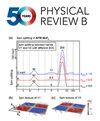铁磁异质结构中的持久结点磁子-光子极化子
IF 3.7
2区 物理与天体物理
Q1 Physics and Astronomy
引用次数: 0
摘要
特征值和特征向量凝聚的异常点是参数空间中的光谱奇异点,要实现这些奇异点往往需要对量子系统中的参数进行微调。由于耗散和耗散耦合的共同作用,当铁磁体足够厚 ∼ 100 nm 时,这种现象会持续存在。我们使用经典方法进行了超越扰动理论的模型计算,开发了一种能够解释欧姆耗散的量子方案,并发现了耦合强度与裸磁子频率相当的超强耦合。通过揭示一个简单的转换关系,我们将这一形式主义扩展到了超导体,并预测超强耦合打开的间隙在很大程度上取决于极化子的传播方向。我们的发现可能有助于在磁子和自旋电子器件中寻找稳健的非赫米提拓扑相。本文章由计算机程序翻译,如有差异,请以英文原文为准。
Persistent nodal magnon-photon polariton in ferromagnetic heterostructures
Exceptional points with coalescence of eigenvalues and eigenvectors are spectral singularities in the parameter space, achieving which often needs fine-tuning of parameters in quantum systems. We predict a persistent realization of nodal magnon-photon polariton, i.e., a polariton of long wavelength without any gap splitting in a thin ferromagnetic insulator film sandwiched by two normal metals, which persistently exists when the ferromagnet is sufficiently thick ∼ 1 0 0
求助全文
通过发布文献求助,成功后即可免费获取论文全文。
去求助
来源期刊

Physical Review B
物理-物理:凝聚态物理
CiteScore
6.70
自引率
32.40%
发文量
0
审稿时长
3.0 months
期刊介绍:
Physical Review B (PRB) is the world’s largest dedicated physics journal, publishing approximately 100 new, high-quality papers each week. The most highly cited journal in condensed matter physics, PRB provides outstanding depth and breadth of coverage, combined with unrivaled context and background for ongoing research by scientists worldwide.
PRB covers the full range of condensed matter, materials physics, and related subfields, including:
-Structure and phase transitions
-Ferroelectrics and multiferroics
-Disordered systems and alloys
-Magnetism
-Superconductivity
-Electronic structure, photonics, and metamaterials
-Semiconductors and mesoscopic systems
-Surfaces, nanoscience, and two-dimensional materials
-Topological states of matter
 求助内容:
求助内容: 应助结果提醒方式:
应助结果提醒方式:


